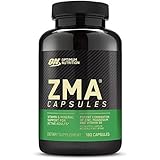As Amazon Associates we earn from qualifying purchases.
ZMA is a favorite for many people to help attain deeper more restful sleep, but what are the ZMA benefits and side effects? And does ZMA really work for all the things some in the fitness industry claim it does? Let’s take a deep dive into the potential ZMA pros and cons to find out.
As mentioned, many athletes and bodybuilders use ZMA because of this deeper sleep (which can often produce the side effect of crazy dreams) effect that may help recovery, but that isn’t the only thing ZMA is apparently good for…
Two things very active people can be deficient in…
- Magnesium
- Zinc
This is usually the result of these minerals being lost during sweating, but ZMA contains both of these as its main ingredients along with vitamin B6.
In sharp contrast to a specific type of creatine which has had hundreds of studies proving that it works, there have been two main studies on zinc magnesium aspartate supplementation. The first1 concluded that ZMA increases:
- Muscle strength
- Free testosterone levels
- IGF-1 levels
It is worth noting however that there is a disclosure of commercial interests within this study that states that “Victor Conte has an equity interest in SNAC System, Inc., patent pending for ZMA”.
The second study2 which flies in the face of the first states that:
The major findings of this study was that dietary supplementation of a commercially available ZMA supplement resulted in a non-significant 12–17% increase in serum zinc levels but did not appear to effect anabolic or catabolic responses to resistance training, body composition, or training adaptations. These findings do not support contentions that ZMA supplementation during training increases muscle mass and/or enhances training adaptations.
pubmed.gov: Effects of Zinc Magnesium Aspartate (ZMA) Supplementation on Training Adaptations and Markers of Anabolism and Catabolism
So nothing is cut and dried with regards to proof that ZMA is effective. Confusing huh?
| Image | Product Details | Buy |
|---|---|---|
 TopTopTopTop TopTopTopTop | NOW Sports Nutrition, ZMA (Zinc, Magnesium and Vitamin B-6), Enhanced Absorption, Sports Recovery*, 180 Capsules | Check Amazon Price |
 TopTopTopTop TopTopTopTop | JYM Supplement Science ZMA Zinc/Magnesium Capsules Supplement - Zinc, Magnesium and Vitamin B6 | JYM Supplemental Science | 90 Vegetarian Capsules | Check Amazon Price |
Top TopTopTopTop TopTopTopTop | OPTIMUM NUTRITION ZMA Muscle Recovery and Endurance Supplement for Men and Women, Zinc and Magnesium Supplement, 180 Count | Check Amazon Price |
 TopTopTopTop TopTopTopTop | SNAC ZMA The Original Recovery and Sleep Supplement that Supports a Healthy Immune System, 180 Capsules (2 Pack of 90 Count) | Check Amazon Price |
 TopTopTopTop TopTopTopTop | PrimaForce ZMA Supplement for Men and Women, 180 Capsules - Zinc, Magnesium and Vitamin B6 for Muscle Recovery & Sleep | Check Amazon Price |

ZMA benefits and side effects
Before we get started on the ZMA benefits and side effects it is worth stating that you probably should not bother taking ZMA if are already getting sufficient magnesium, zinc and vitamin B6 from your diet. In fact, it can actually be harmful.
In that vein, let’s get started with zinc and its possible side effects.
Side effects of too much zinc
Can zinc be harmful?
Yes, if you get too much. Signs of too much zinc include nausea, vomiting, loss of appetite, stomach cramps, diarrhea, and headaches. When people take too much zinc for a long time, they sometimes have problems such as low copper levels, lower immunity, and low levels of HDL cholesterol (the “good” cholesterol).3
U.S. Department of Health & Human Services, Office of Dietary Supplements
On top of the above, there is a risk of stomach and kidney damage.
The office of dietary supplements quoted above also state that the daily upper limit for zinc is 40mg, so ZMA is within these parameters, but bear in mind this limit includes zinc from your diet, not only supplementation.
So if you are already deficient in zinc, ZMA likely isn’t going to hurt you. But there is a hidden argument there for ZMA cycling if you do decide to use it. Click the previous link for a table with further information on the ZMA cycle lengths that are possible.
Benefits of zinc
Research has shown the people may get the following benefits from having sufficient levels of zinc in the body.
- Increased immunity
- Antioxidant properties
- Increased testosterone and fertility
- Improved circulation & heart health
- Increases nutrient digestion and absorption
- Help repair and grow muscle tissue.
The above is by no means an exhaustive list, rather a selected few that will likely be of most interest to HOG readers.
Side effects of too much magnesium
The ratios of magnesium, zinc and vitamin B6 are also touted as very important. Although I can find nothing official about ‘ratios’, it seems that while ZMA falls within the upper limits stated at the National Institutes of Health website for zinc3 and vitamin B12,4 magnesium5 goes slightly over this recommendation. The site does, however, state that…
Can zinc be harmful?
Magnesium that is naturally present in food is not harmful and does not need to be limited. In healthy people, the kidneys can get rid of any excess in the urine. But magnesium in dietary supplements and medications should not be consumed in amounts above the upper limit, unless recommended by a healthcare provider.
U.S. Department of Health & Human Services, Office of Dietary Supplements
So it seems there are no obvious health risks with going over the RDA on magnesium, and with ZMA being a product for active people the extra amount in the dosage makes sense.
On the flip side of that argument, active people should be eating more anyway and thus be ingesting more via their diet… Unless you are one of those misinformed people who think exercising and eating next to nothing is the best way to lose weight.
It is also worth noting that although very rare, magnesium overdose (or hypermagnesemia) is possible, particularly in people with kidney disorders, heart disease or gastrointestinal disorders.
Symptoms of a magnesium overdose include:
- Diarrhea
- Respiratory distress
- Vomiting/nausea
- Muscular weakness
- Lethargy
- Low blood pressure
- Urine retention
- Irregular heartbeat
- Cardiac arrest
Yes… cardiac arrest!
Don’t take more than the recommended amount. Too much of a good thing etc. This gives us a second reason to consider ZMA supplement cycling to allow the kidneys time to process any excess.
Benefits of magnesium
As with zinc, magnesium is extremely important to the proper functioning of the human body. Some of the benefits of magnesium in optimal amounts are:
- Protein synthesis
- Formation of healthy bones
- Blood pressure regulation
- Maintaining heart health
- Stimulates mineral absorption
- Relieves anxiety
- Increased energy
- Nerve function
- Blood sugar control
- Relieves PMS symptoms
- Relieves anxiety
Again, this is not an exhaustive list.
Side effects of too much vitamin B6
Here’s what you should be on the lookout for with regards to taking too much vitamin B6.
- Decreased sensation/numbness
- Nerve damage
loss of coordination - Sleepiness
- Upset stomach
- Heartburn
- Unsightly skin patches
- Headache
- Sunlight sensitivity
If you experience any of these symptoms or those listed for the side effects of zinc or magnesium then it would be advisable to stop ZMA supplementation immediately and see a medical professional.
As the office of dietary supplements states below, symptoms will usually clear up if supplementation is stopped, but this gives yet another good reason for ZMA cycling.
Can vitamin B6 be harmful?
People almost never get too much vitamin B6 from food. But taking high levels of vitamin B6 from supplements for a year or longer can cause severe nerve damage, leading people to lose control of their bodily movements. The symptoms usually stop when they stop taking the supplements.4
U.S. Department of Health & Human Services, Office of Dietary Supplements
Benefits of vitamin B6
Some of the possible benefits of having optimal levels of vitamin B6 in the body include:
- Improved brain function in older individuals
- Improved serotonin production
- Improved melatonin production
- Improved norepinephrine production
- Protects blood vessels
- Reduces inflammation
- Helps manage cholesterol
Again, there are more benefits to be found, but these are the benefits we believe will most likely to be of interest to our readers.
ZMA side effects on dreams & sleep
Although you may not be interested in the crazy ZMA dreams that many people experience, they bear mentioning.
If you start experiencing the dream side effects of ZMA and they are actually disturbing you then it might be worth taking ZMA in the morning or later in the day. For more info see the section on best time to take ZMA for details on how to do this without ruining the absorption of ZMA’s ingredients.
It is also interesting to note that vitamin B6 is often taken by people who want to experience lucid dreaming, so it is a likely culprit for this particular ZMA side effect, but it’s possible that magnesium and/or zinc add to this effect in some way.
With regards to sleep, the general consensus seems to be that ZMA is not really effective for actually getting to sleep, but it can aid in a deeper more restful sleep which aids recovery for those who are highly active.
ZMA vs zinc and magnesium separately
“Why don’t I just supplement with magnesium and zinc, it’s cheaper?” You may ask.
Well to begin with, along with vitamin B6 (pyridoxine) the type of zinc found in ZMA known as ‘zinc monomethionine’ and the type of magnesium known as ‘magnesium aspartate’ are both one of the most bioavailable forms of these minerals. Much of the supplemental stuff you’ll see on the shelves of supermarkets contain less bioavailable forms such as zinc gluconate or magnesium oxide, the latter of which is sometimes included in much higher ZMA dosage and timing in an attempt to offset this poor bioavailability.6
On top of this, the inclusion of vitamin B6 also helps with the absorption and utilization of magnesium so there is good reason for it to be in the mix aside from its own inherent benefits.
So, as I did at first, you might think supplementing zinc and magnesium separately instead of buying ZMA may help you to save money on supplementation, but you may be getting low-quality ingredients, and if they are not being absorbed by your body to any degree then you’re probably throwing that money away.
It seems that, at least in this case, you are going to have to hand over the readies for your supplements as a deciding factor on how ZMA works well is the ratio and quality of the ingredients.
The sensible counter-argument here is that you may only be deficient in one or two of ZMA’s ingredients. If this is the case, then it may be wise to only supplement with that particular thing rather than risk taking too much of the other ingredients. If that is the case, try to get a good quality product that is easily absorbed by the body.
If you do go that route, we did an article on the cheapest place to buy supplements which you can check out.
When is the best time to take ZMA supplements
When to take ZMA
Take 20 minutes to an hour before bed and at least an hour after eating your last meal of the day.
If those strange ZMA dreams bother you, you can try taking it earlier in the day, but again, try to leave at least an hour between eating anything before or after ZMA supplementation.
Also never take with calcium as it can block zinc absorption.
ZMA cycle options
Bear in mind, too much of a good thing is possible!
This is particularly true with zinc supplements hence many people following a ZMA cycle like those below.
- 3 weeks on – 1 week off
- 6 weeks on – 2 weeks off
- No ZMA weekends
- ZMA every other day
- Only on training days
Recommended ZMA dosage*
Men: 3 tablets a day containing:
- 450mg magnesium
- 30mg zinc
- 10-11mg vitamin B6
Women: 2 tablets a day containing:
- 300mg magnesium
- 20mg zinc
- 6.6-7.3mg vitamin B6
*Recommended dosage of ZMA according to most manufacturers.
Does ZMA work?
The big question that everyone want to know the answer to is “does ZMA really work?” of course, but there is no simple answer to this as it depends on why you are taking it, and the current levels of ZMA ingredients already present in your body. I certainly find it hard to say that everyone should take ZMA, especially considering some of the possible side effects.
If you are not very active and eat a healthy, balanced diet, then you most probably won’t need ZMA for physical performance. It should likely only be a consideration for those who are very active and have a hard time consuming enough food to keep up with the losses of these minerals through sweating. Even then it might be advisable to cycle off ZMA.
On the upside, ZMA is a convenient way to get these minerals in the correct forms and dosage ratio without having to take 3 different products if you are already deficient in magnesium and zinc then ZMA, and will almost certainly improve your performance (if not your well-being in general).
Although it may help, if you are taking ZMA for recovery purposes, then it may be a better idea to first try improving your sleep hygiene. This might give you the desired results you are looking for rather than taking ZMA as a sleep supplement.
Finally, all three ingredients in ZMA are known to interact with certain medications, so definitely see a medical professional if you are already taking something else. It’s better to be safe than sorry!
- HIGH QUALITY FORMS OF ZINC, MAGNESIUM, AND VITAMIN B6
- 30MG ZINC, 450MG MAGNESIUM, 10.5MG VITAMIN B6
- ACTIVE LIFESTYLE FORMULA - your body demands greater nutritional needs to fuel your active lifestyle, ZMA can help fill gaps in your micronutrient intake
- AVAILABLE IN 90 and 180ct BOTTLES
Our advice is to ask your doctor how your magnesium and zinc levels measure up and then weigh up the ZMA pros and cons armed with this information.
FAQs
How long does it take for ZMA to work?
As far as effects on sleep goes, some report dramatic effects within two to three days, others up to two weeks. Other people report no effect at all after prolonged use. Why? It may be down to consuming other things at the same time, or your levels are already fine.
When should I take ZMA?
For best effects the window when you should take ZMA is twenty minutes to an hour before you go to bed, and at least one hour after eating the last meal of the day. Also, never take it with calcium as this can block the absorption of zinc.
Does ZMA cause acne?
The general consensus seems to be that the three ingredients in ZMA should actually be good for your skin and will actually help to clear up acne!
- 1 American Society of Exercise Physiologists: Effects of a Novel Zinc-Magnesium Formulation on Hormones and Strength
- 2 pubmed.gov: Effects of Zinc Magnesium Aspartate (ZMA) Supplementation on Training Adaptations and Markers of Anabolism and Catabolism
- 3 U.S. Department of Health & Human Services, Office of Dietary Supplements: Zinc Fact Sheet for Consumers
- 4 U.S. Department of Health & Human Services, Office of Dietary Supplements: Vitamin B6 Fact Sheet for Consumers
- 5 U.S. Department of Health & Human Services, Office of Dietary Supplements: Magnesium Fact Sheet for Consumers
- 6 pubmed.gov: Bioavailability of US commercial magnesium preparations
Amazon and the Amazon logo are trademarks of Amazon.com, Inc, or its affiliates.




